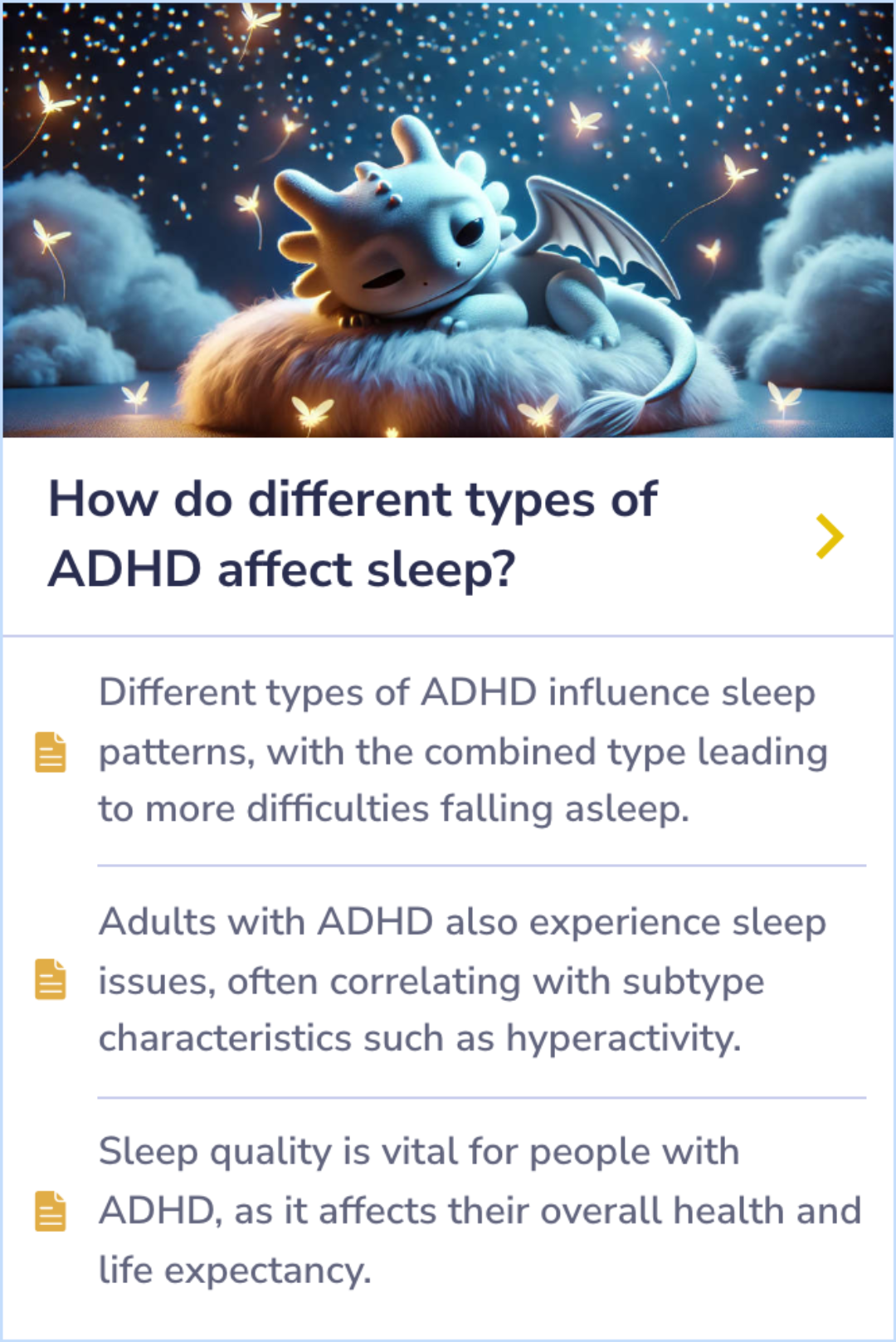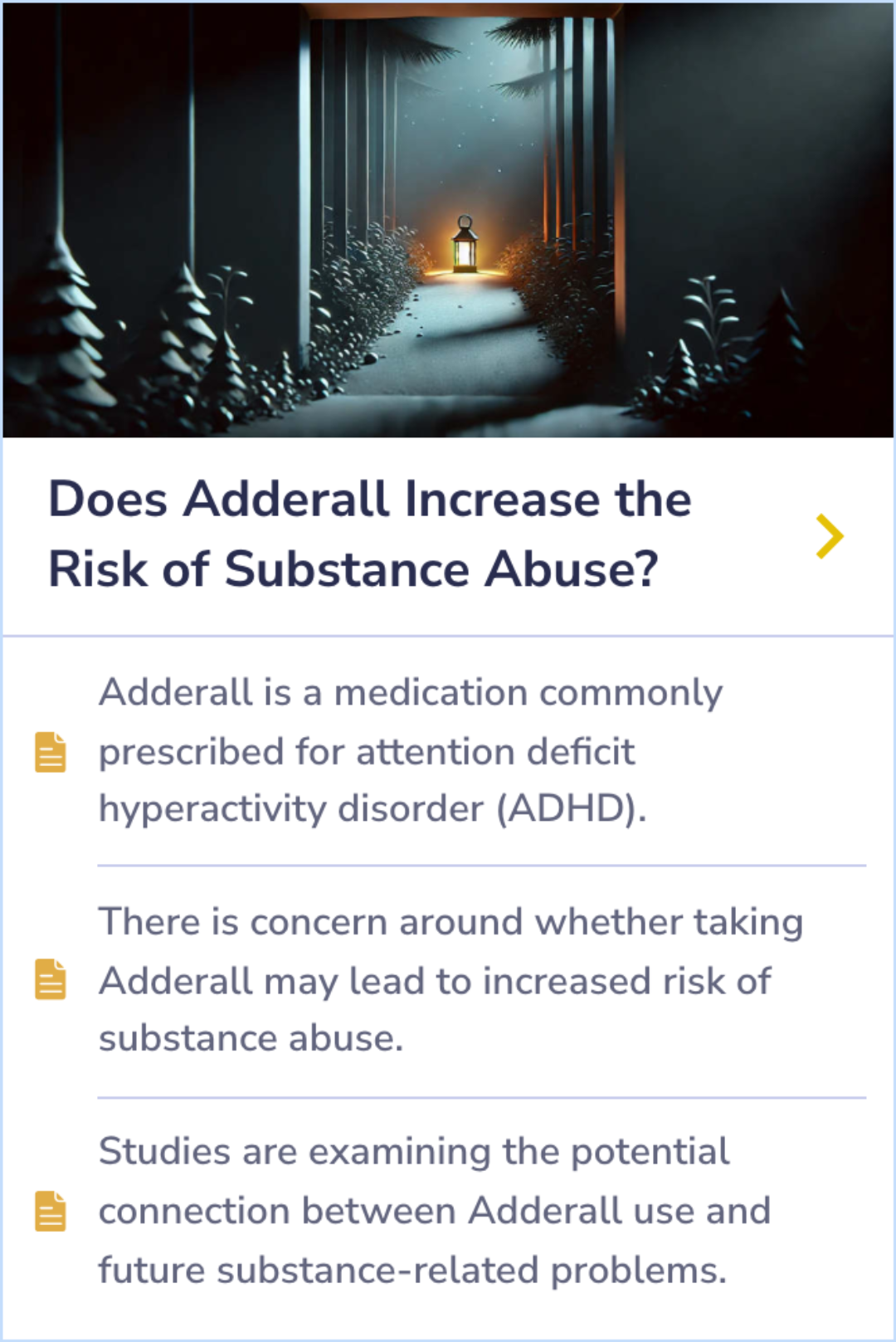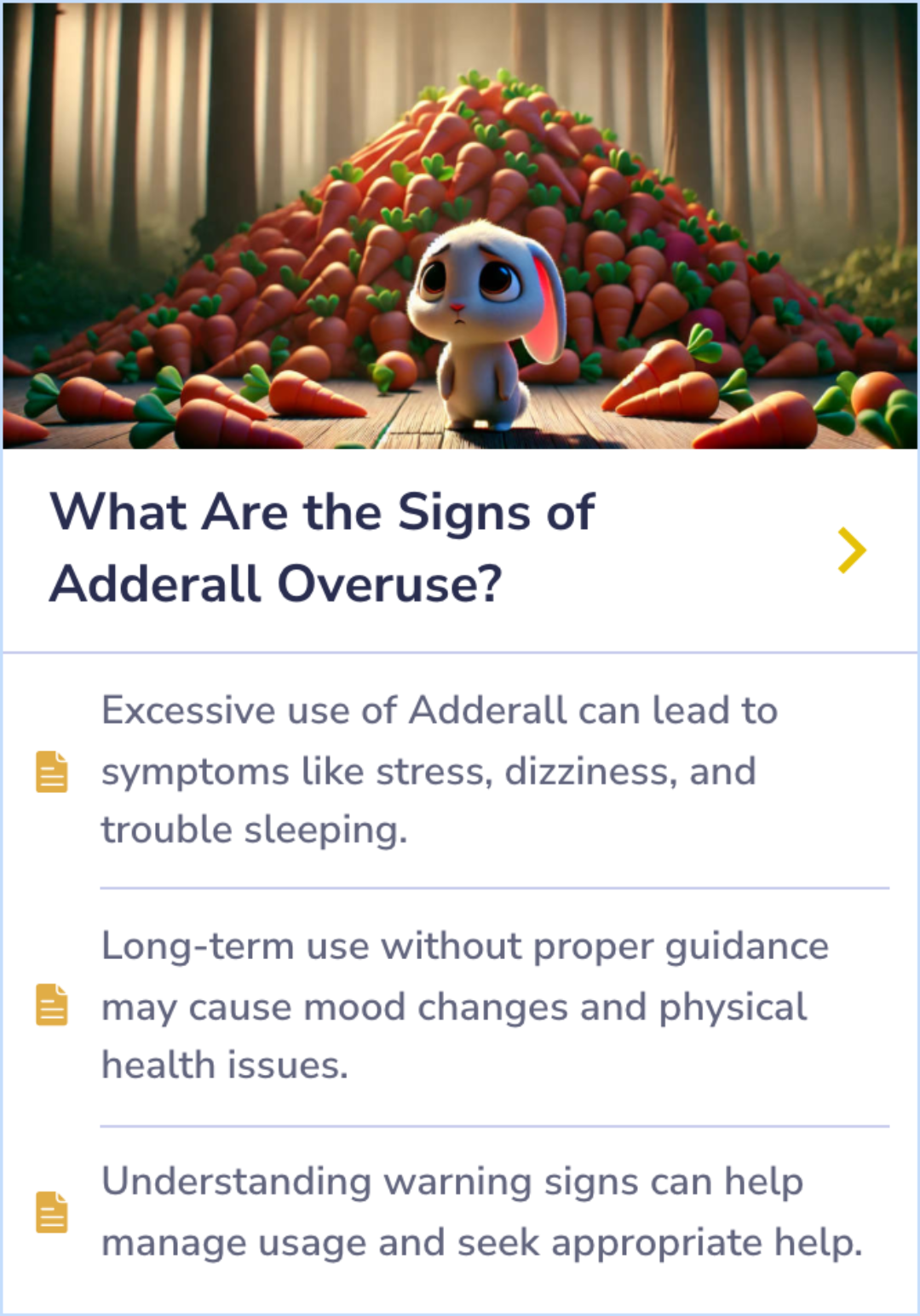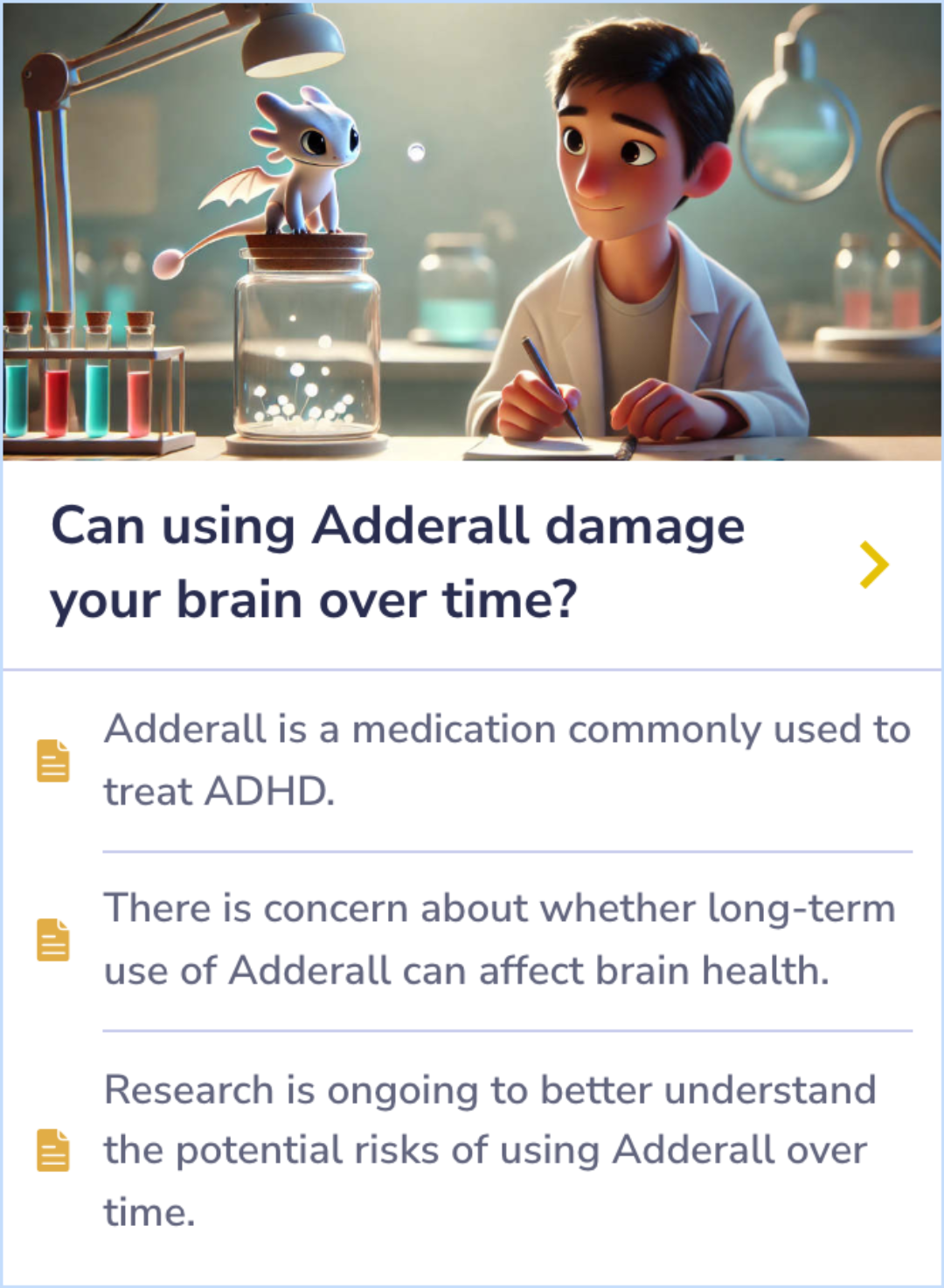Adderall
Evidence Based Answers
How Does Adderall Affect Sleep?
Adderall can make falling asleep harder, shorten sleep duration, and lead to severe insomnia, especially with long-term use. Effects vary by individual and sleep patterns.
Published: October 24, 2024
Click to explore a section:
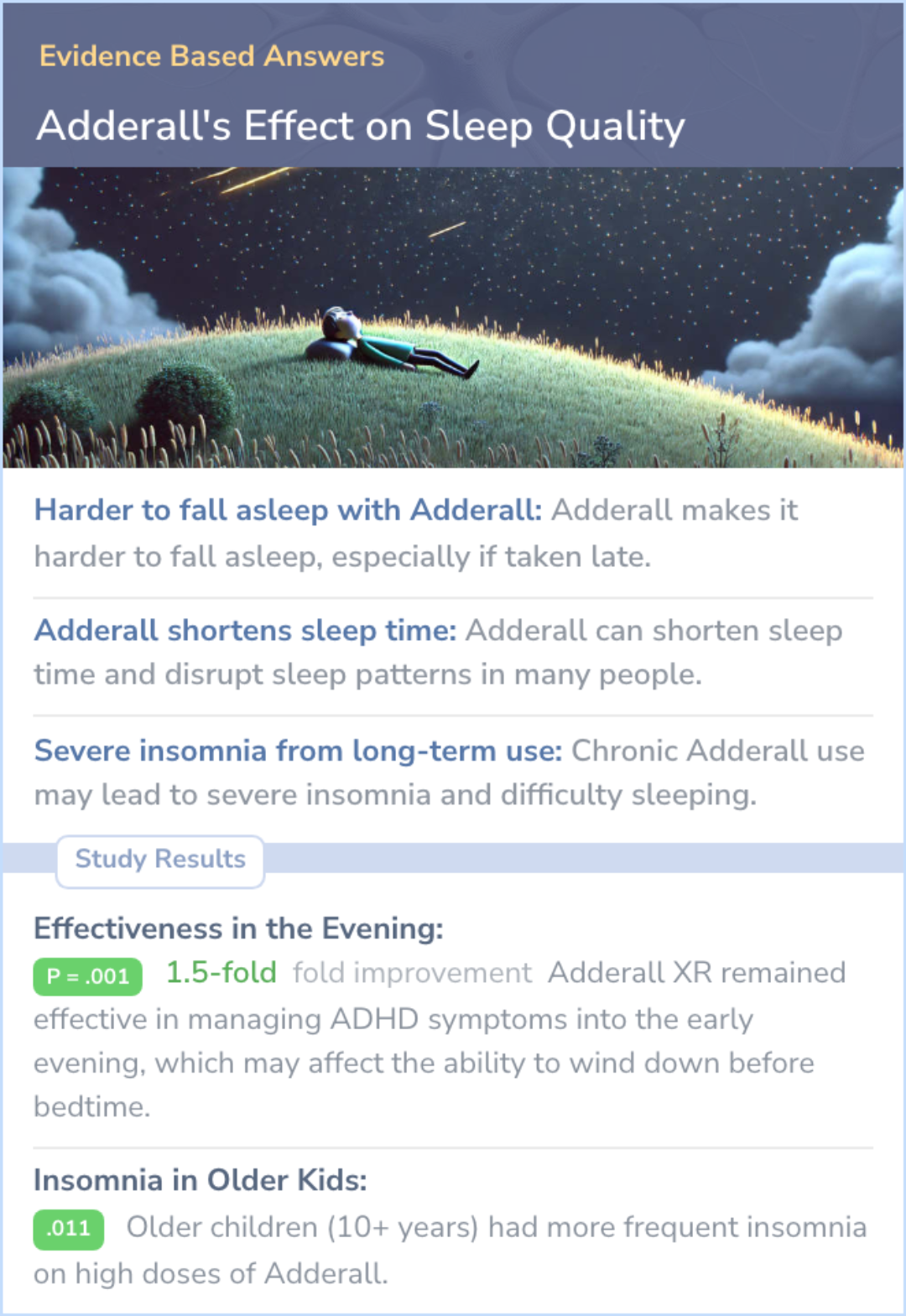
Adderall can delay sleep, shorten sleep time, and cause insomnia, especially with long-term use.
Studies Summary
🛌
Adderall and Sleep Challenges
Adderall can disrupt sleep onset, making it tough to fall asleep, especially when taken later in the day.
⏰
Adderall's Impact on Sleep Quality
The drug often shortens sleep duration and disrupts patterns, worsening for those with existing sleep problems.
😴
Severe Insomnia from Chronic Use
Long-term use of Adderall can lead to severe insomnia, significantly affecting mental and physical health.
Highly Cited Studies
Long term Effects of Methylphenidate in Adults
Peer Reviewed Study 1
ADHD Medications and Sleep Issues
Peer Reviewed Study 2
Adderall's Impact on Behavior and Evening Side Effects
Peer Reviewed Study 3
Adderall XR's Daylong Effects and Safety in Children
Peer Reviewed Study 4
Impact of Extended-Release Adderall XR on Daytime Behavior in Children with ADHD
Background: Adderall and Its Impact on Sleep Onset
Adderall, a central nervous system stimulant, can make it harder for people to fall asleep, especially when taken later in the day. The drug alters the levels of certain chemicals in the brain, leading to prolonged wakefulness.
Healthcare providers often recommend avoiding late evening doses of Adderall to minimize the risk of insomnia and difficulty falling asleep.
Healthcare providers often recommend avoiding late evening doses of Adderall to minimize the risk of insomnia and difficulty falling asleep.
“
Source Quotes:
Late evening doses should be avoided because of the resulting insomnia.
Dextroamphetamine and amphetamine combination should not be taken in the late afternoon or evening because it may cause difficulty falling asleep or staying asleep.
Background: How Adderall Affects Sleep Quality and Duration
Adderall can negatively impact both the quality and duration of sleep. Individuals who take Adderall may experience shorter sleep times and disrupted sleep patterns. These effects are more pronounced in those who already have sleep problems.
The medication can also increase the time it takes to fall asleep, further reducing overall sleep duration.
The medication can also increase the time it takes to fall asleep, further reducing overall sleep duration.
“
Source Quotes:
In a meta-analysis of 9 articles, the use of psychostimulant medication was associated with longer sleep latency, worse sleep efficiency, and shorter sleep duration.
Insomnia and nervousness are the most commonly reported adverse effects in patients using methylphenidate.
Background: Severe Insomnia from Chronic Adderall Use
Chronic use of Adderall can lead to severe insomnia, making it extremely difficult to get any sleep at all. Over time, this can have serious effects on a person's mental and physical health. The stimulation from Adderall can keep the brain overly active, making it difficult to wind down at night, even when the body is exhausted.
“
Source Quotes:
Manifestations of chronic intoxication with amphetamines include severe dermatoses, marked insomnia, irritability, hyperactivity, and personality changes.
The most common drug-related effects are loss of appetite, insomnia, emotional lability, nervousness and fever.
Background: Preexisting Sleep Issues and Adderall
Individuals with preexisting sleep issues may experience varying effects when taking Adderall. For some, the medication may worsen sleep problems, while for others, it may actually improve sleep quality. This variability is due to differences in how each person's body responds to the drug, as well as the timing and dosage of the medication.
Patients should report any preexisting sleep issues to their healthcare provider before starting Adderall, so that the medication can be managed effectively.
Patients should report any preexisting sleep issues to their healthcare provider before starting Adderall, so that the medication can be managed effectively.
“
Source Quotes:
In a study of MPH in children with ADHD, 23% of participants without preexisting sleep problems developed sleep problems while taking MPH, whereas 68.5% of those with preexisting sleep problems no longer experienced sleep problems after taking MPH.
It is particularly important to obtain a dietary history (eg, appetite, picky eating) and history of sleep patterns before initiation of pharmacotherapy to avoid attributing preexisting problems to medications.
Peer Reviewed Study
Study: ADHD Medications and Sleep Issues
The study compared two types of ADHD medications: extended-release dexmethylphenidate (ER d-MPH) and extended-release mixed amphetamine salts (ER MAS). It found that both types of medication were linked to improvements in ADHD symptoms. However, insomnia, a common side effect, was more frequent at higher doses of both medications. This suggests that, like other stimulants, higher doses of these ADHD treatments can increase the likelihood of sleep issues.
The findings show that while both medications are effective, they both also raise the risk of sleep problems, particularly with higher doses.
The findings show that while both medications are effective, they both also raise the risk of sleep problems, particularly with higher doses.
author
Stein MA, Waldman ID, Charney E, Aryal S, Sable C, Gruber R, Newcorn JH
journal
J Child Adolesc Psychopharmacol
Date Published
2011 Dec
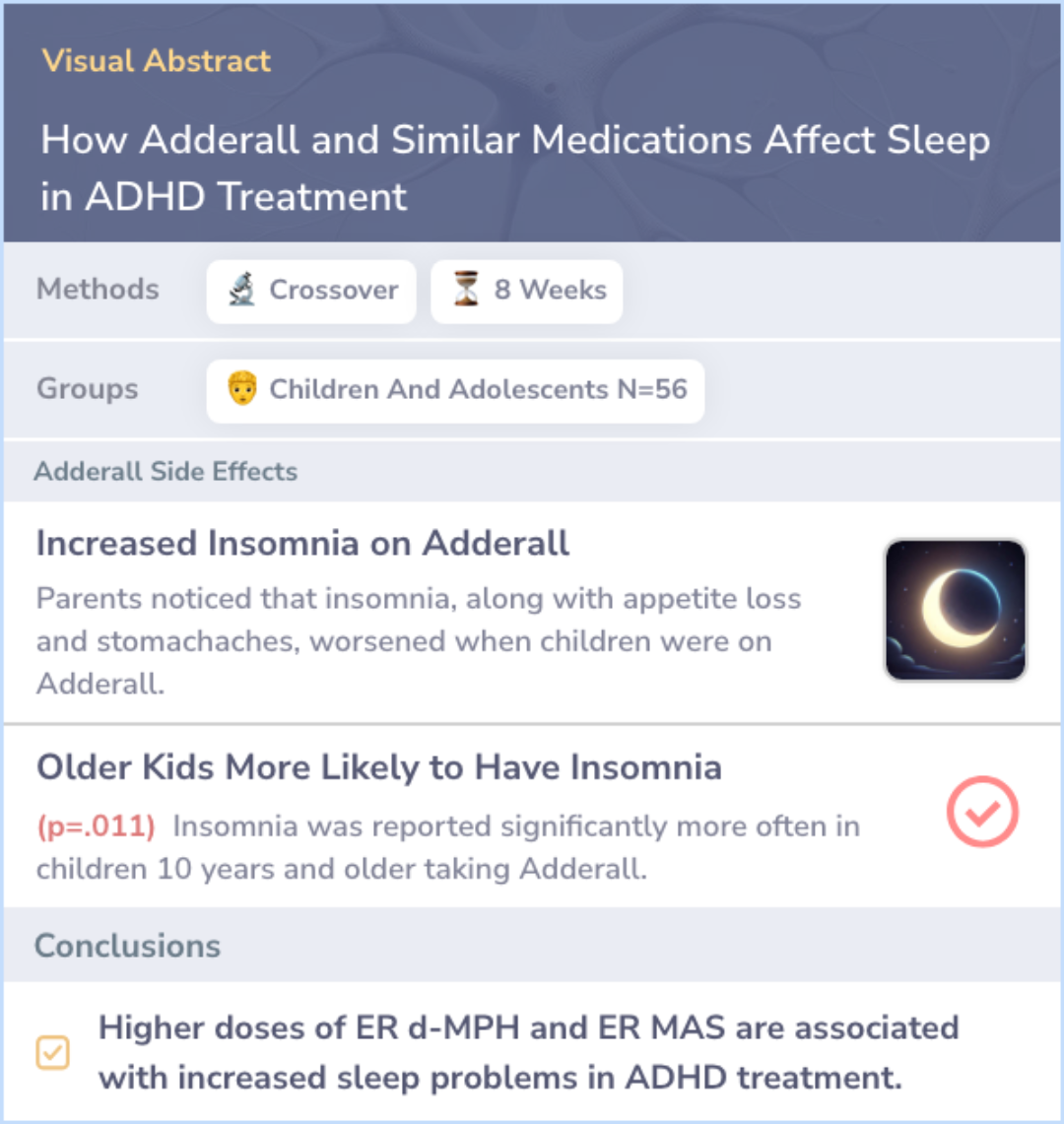
Peer Reviewed Study
Study: Adderall's Impact on Behavior and Evening Side Effects
This study compared the effects of Adderall and methylphenidate (MPH) on behavior during a school day and in the evening. A single morning dose of Adderall had effects that lasted throughout the school day, similar to two doses of MPH. When evaluating evening behavior, Adderall taken at 3:30 PM showed significant changes, while MPH at the same time only showed significant improvement at a higher dose.
This suggests that Adderall might affect evening behavior and potentially sleep differently than MPH.
This suggests that Adderall might affect evening behavior and potentially sleep differently than MPH.
author
Pelham WE, Gnagy EM, Chronis AM, Burrows-MacLean L, Fabiano GA, Onyango AN, Meichenbaum DL, Williams A, Aronoff HR, Steiner RL
journal
Pediatrics
Date Published
1999 Dec
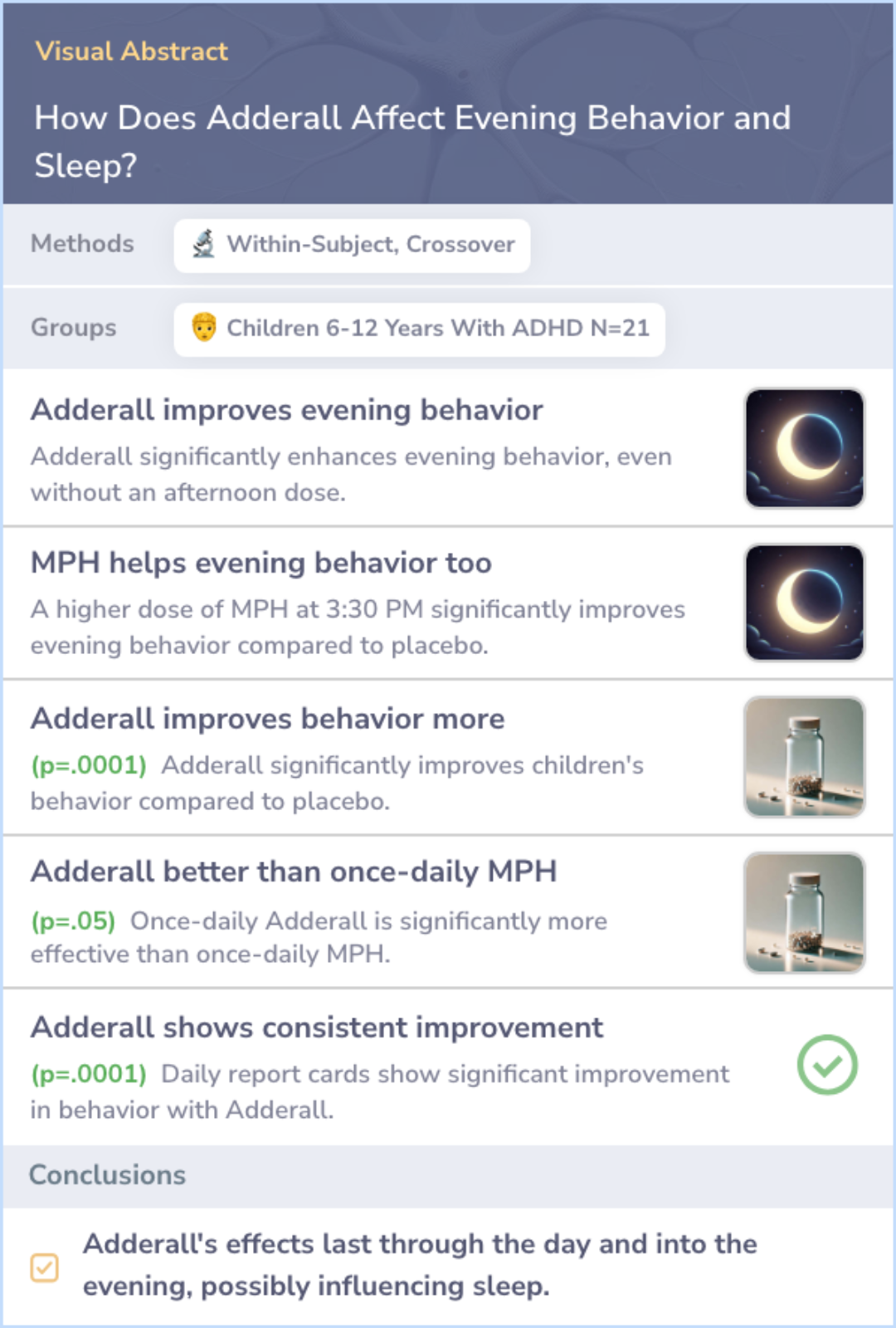
Peer Reviewed Study
Study: Adderall XR's Daylong Effects and Safety in Children
This study examined the effects of Adderall XR (SLI381), an extended-release formulation, on behavior in children with ADHD. The medication was designed to last throughout the day with a single morning dose.
The results showed significant improvement in behavior during morning, afternoon, and late afternoon assessments compared to placebo. This indicates that Adderall XR maintains its therapeutic effects throughout the day.
As for safety, the incidence of reported adverse events was low and similar across active treatment groups and placebo.
The results showed significant improvement in behavior during morning, afternoon, and late afternoon assessments compared to placebo. This indicates that Adderall XR maintains its therapeutic effects throughout the day.
As for safety, the incidence of reported adverse events was low and similar across active treatment groups and placebo.
author
Biederman J, Lopez FA, Boellner SW, Chandler MC
journal
Pediatrics
Date Published
2002 Aug
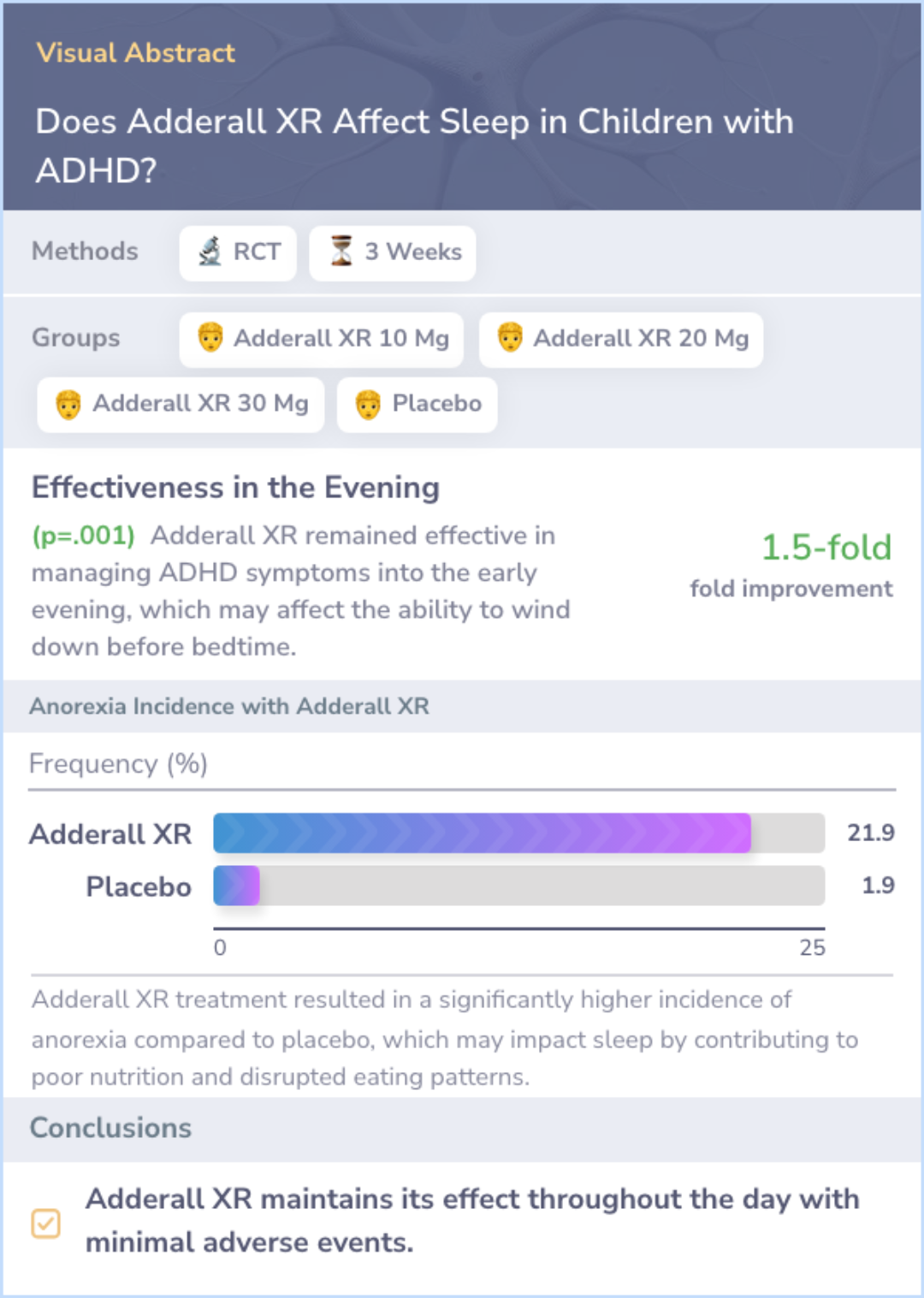
Peer Reviewed Study
Study: Impact of Extended-Release Adderall XR on Daytime Behavior in Children with ADHD
SLI381 (Adderall XR) is a long-acting form of Adderall, intended to provide effects throughout the day with one morning dose. This study evaluated SLI381's effectiveness in children with ADHD during the morning, afternoon, and late afternoon. Results showed significant behavioral improvements throughout the day for children taking SLI381, compared to a placebo.
The study also found that the extended-release formulation of SLI381 led to consistent improvements in behavior in the afternoon and late afternoon, indicating its lasting effects.
The study also found that the extended-release formulation of SLI381 led to consistent improvements in behavior in the afternoon and late afternoon, indicating its lasting effects.
author
Ahmann PA, Theye FW, Berg R, Linquist AJ, Van Erem AJ, Campbell LR
journal
Pediatrics
Date Published
2001 Jan
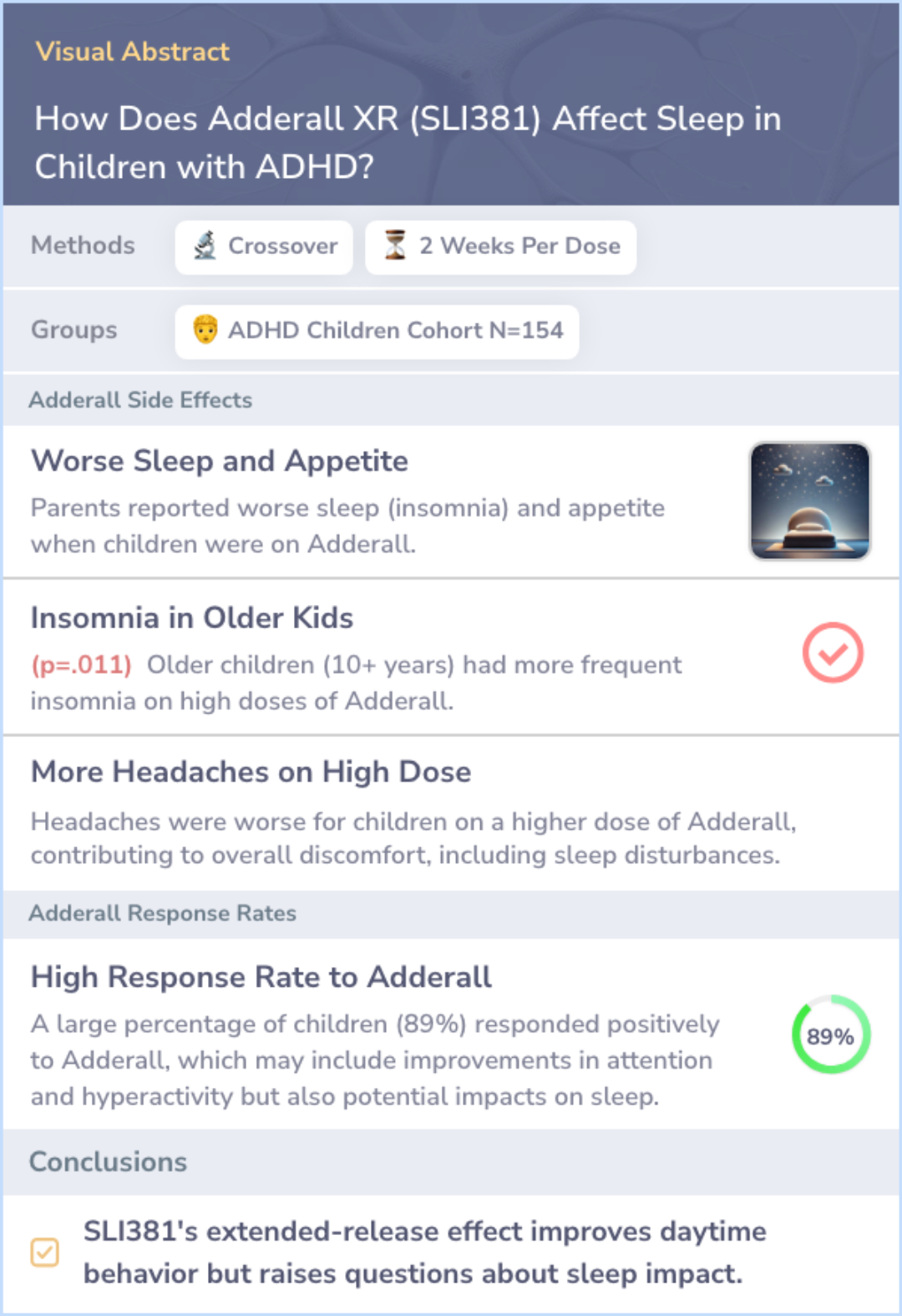
Key Takeaways
Conclusions
Adderall, commonly prescribed for ADHD, can significantly affect sleep patterns, often leading to difficulties in falling asleep and reduced sleep quality. The studies show that higher doses of Adderall and similar stimulants increase the likelihood of sleep issues, particularly insomnia.
While Adderall XR is effective throughout the day, its lasting effects can extend into the evening, potentially disrupting sleep. The relationship between Adderall and sleep is complex, especially for individuals with preexisting sleep issues, who may experience varying outcomes depending on dosage and timing.
While Adderall XR is effective throughout the day, its lasting effects can extend into the evening, potentially disrupting sleep. The relationship between Adderall and sleep is complex, especially for individuals with preexisting sleep issues, who may experience varying outcomes depending on dosage and timing.

Evidence Summary
ADHD Subtypes and Their Impact on Sleep
ADHD affects sleep differently based on subtype. The combined type often struggles more with falling asleep. For adults, sleep disturbances align with ADHD traits like hyperactivity. Quality sleep is important, influencing health and longevity.
In connection, Adderall complicates sleep when taken late, disrupting sleep onset and quality. Managing dosing time reduces these effects, resonating with those already facing sleep challenges.
In connection, Adderall complicates sleep when taken late, disrupting sleep onset and quality. Managing dosing time reduces these effects, resonating with those already facing sleep challenges.
Evidence Summary
Adderall: Potential Path to Substance Abuse?
Exploring whether Adderall use may increase the risk of substance abuse raises ongoing questions. This ADHD medication often sparks concern about its potential link to substance-related issues. Several studies examine how taking Adderall might relate to future substance abuse problems.
While focusing on past concerns, research continues to evaluate Adderall's long-term effects beyond its immediate impact on sleep.
While focusing on past concerns, research continues to evaluate Adderall's long-term effects beyond its immediate impact on sleep.
Evidence Summary
Recognizing Adderall Overuse Symptoms
Adderall overuse can lead to a range of symptoms, including anxiety, sleep difficulties, and physical discomfort, which are important to notice for effective management. Excessive use may cause stress, dizziness, or trouble sleeping, and long-term use without proper guidance could lead to mood changes and other health problems.
Recognizing these warning signs can help manage usage and encourage seeking appropriate help.
Recognizing these warning signs can help manage usage and encourage seeking appropriate help.
Evidence Summary
Long-Term Risks of Adderall on Brain Health
Adderall's potential risks on brain health are under scrutiny, highlighting concerns about its long-term use. While commonly prescribed for ADHD, ongoing questions persist regarding its lasting effects on the brain. This exploration emphasizes how continued research is vital in assessing the medication's implications over time.
Understanding these potential brain health effects is as essential as understanding its influence on sleep, given its central role in both aspects.
Understanding these potential brain health effects is as essential as understanding its influence on sleep, given its central role in both aspects.
